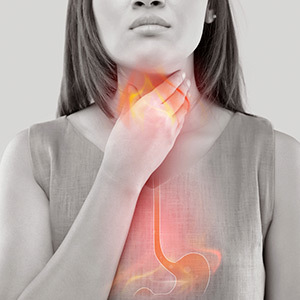You may be suffering from GERD, or gastroesophageal acid reflux disease. This is a digestive disorder caused by esophageal muscles malfunctioning.
What Causes GERD?
GERD, or chronic acid reflux, is a more severe and serious version of acid indigestion that occurs when a part of the esophagus stops working properly or becomes weak. Normally, a ring shaped valve forms a seal to separate the stomach contents and the esophagus. This prevents refluxing or backflowing of the stomach contents. The muscular valve opens when food or drinks are consumed. This allows the contents of the stomach to be transported down into the stomach via the digestive tract.
You may be suffering from GERD if you have heartburn or acid indigestion at least twice a month. A doctor can help you with a diagnosis and treatment.
Conservative Treatments Of GERD
If you don’t get your acid reflux correctly diagnosed, or if you ignore treatment for gastroesophageal disease, this can eventually lead to severe inflammation and scarring in the esophagus. Untreated GERD is linked to esophageal carcinoma.
Some people use conservative methods to manage GERD symptoms. Even those who choose medical treatment can benefit by making lifestyle changes.
Modify your diet: Certain foods and recreational items can trigger acid reflux or GERD. Keep a food journal and record all foods and drinks consumed prior to symptom flare ups. Eliminate the foods that cause symptoms. Offenders include spicy, rich and citrusy foods as well as fatty, alcoholic and nicotine products.
Exercise and lose weight: Obesity causes GERD for many adults. It is important to maintain a healthy body weight in order to reduce pain and discomfort caused by GERD.
Do not eat before you lie down. GERD is caused when stomach contents push up. This is easier to do when you are prone or in other positions. Avoid the prone posture after eating.
Sleep with your head elevated: Some find it helpful to sleep on an incline, where the bed’s head is raised at least 4 to 6 inches. This helps to prevent symptoms from escalating.
Use PPIs and antacids together: Proton pumps inhibitors help to reduce symptoms of acid reflux disease and GERD. PPIs can be used by those with heartburn who don’t respond well to H2 blockers or antacids. Antacids neutralize the stomach acid and help to prevent heartburn.
The dangers of long-term PPI use
If you take proton pump inhibitors for more than two weeks, it can cause additional symptoms and complications that require medical attention. Long-term use can cause constipation and stomach pain. It may also lead to ulcers, an elevated pH in the stomach, flatulence or diarrhea. Talk to your doctor about any over-the counter medications or remedies you are considering for GERD or acid reflux.
Self-care, lifestyle changes, and over-the counter medications may not be enough to prevent mild acid reflux symptoms or gastroesophageal disease. There are prescription medications and surgical procedures that can reduce the symptoms of these conditions and ease the pain.
TIF Surgery: Permanent Cure For GERD
Incision-free treatment for gastroesophageal disease is possible thanks to advancements in medical technology. It is so safe, effective and permanent that anyone suffering from acid reflux or chronic heartburn can benefit from it.
Transoral incisionless Fundoplication (TIF) is a minimally invasive procedure that treats acid reflux, heartburn and GERD. This is a simple, yet highly effective outpatient procedure. The procedure is done without incisions. After a short stay in the recovery room, patients can return home. The downtime is also minimal. The patients can resume their normal routines the next day. Acid reflux, heartburn, and GERD symptoms are relieved for a long time.
TIF surgery benefits for GERD
Surgery may not be appealing to treat a condition such as GERD. It’s therefore important to weigh the pros and cons of treatment. You should also consider the impact of treatment on your quality-of-life.
TIF surgery has FDA approval and is highly effective in curing GERD. Patients not only get rid of their GERD symptoms but also enjoy the following benefits.
- There is no bloating, or flatulence. You don’t have to worry about any embarrassing or noxious sounds or smells.
- No incisions, no implants. Fast recovery.
- Most health insurance companies cover this service to prevent delays in treatment and help facilitate faster relief.
- There is less trauma, and the surgery is minimally invasive.
- Eliminates all the risks and side effects of traditional surgery.
TIF surgery: Who is it right for?
TIF surgery is not for everyone. Those who have not been able to control their GERD symptoms through lifestyle changes, proton pumps inhibitors and other remedies are good candidates. TIF surgery is also beneficial for those who want to explore surgical options, but are hesitant about conventional treatments.
You may be a candidate for the transoral incisionless Fundoplication if you have frequent episodes of heartburn or acid reflux that are unmanageable and do not respond to PPIs, antacids, or antacids. If you’re concerned about the risks of using a proton pump inhibitor long-term, you might also be a candidate.

